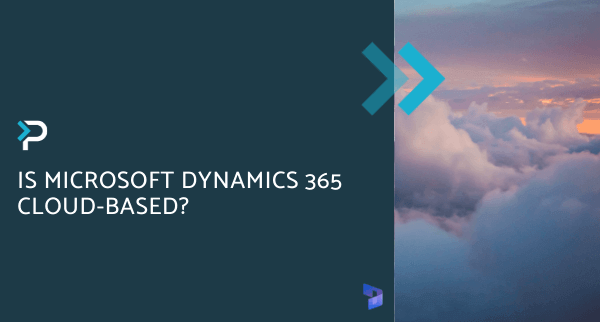What is the difference between Dynamics 365 Cloud and On-Premise?
What is the difference between Dynamics 365 Cloud and On-Premise?
April 5th, 2024
5 min read
Cloud and on-premise are the two primary deployment methods for Microsoft Dynamics 365. In this blog, we will examine the key differences between Dynamics 365 Cloud and On-premise deployment. As well as dispelling some common misconceptions surrounding the two methods, helping you decide which approach is best for your business.
What is Dynamics 365 On-Premise?
On-premise is the traditional method of CRM deployment, it is where a business purchases the software and hosts the software on their servers. In practice, this means that the software is physically located on the business’s premises, and users can access it through their local network. This enables businesses to have full control over how and where their information is stored and managed.
It is important to note that with this in-house control comes heightened responsibility, your business will be solely accountable for the upkeep and maintenance of the hardware, which could be costly in the long run.
Why would you choose On-Premise?
On-premise deployment is ideal for businesses who require complete control over both their server and data stored. This helps ensure all your data is configured to meet your business’s regulatory or compliance needs.
In these cases, businesses often already have an established infrastructure and hardware setup in place; this can often be used for Dynamics 365 as well and could reduce the cost of implementation significantly.
Benefits of D365 On-Premise
- Greater control over your data
- Increased ability to comply with required legislation
- Works with a basic internet connection
Disadvantages of D365 On-Premise
- Infrastructure is expensive to maintain
- Initial set up cost is greater than cloud implementation costs
- System updates need to be managed and carried out internally
- No access to cloud-based services and features such as Power BI, Power Apps, Power Automate, Web Portals etc.
- Increased responsibility and liability placed on the business to keep the data safe
What is Dynamics 365 Cloud (Online)?
Dynamics 365 Cloud, also known as Dynamics 365 Online, is a cloud-based software service provided by Microsoft. Your data is hosted within Microsoft’s secure cloud infrastructure, keeping your data safe without the need for on-site hardware. Different from on-premise deployments, the cloud version of Dynamics 365 is far more flexible and can be employed remotely, saving both time and money.
Why would you choose Cloud deployment?
Online deployment offers a huge range of benefits from remote access, a 99.9% uptime guarantee and the ability to leverage additional cloud-based features like the Power Platform. All-in-all D365 Cloud requires less effort to maintain as it is handled centrally by Microsoft, but there are still some areas to consider, we have covered these below.
Benefits of D365 Cloud
- Remote access – work from anywhere
- No infrastructure to maintain, updates are conducted automatically by Microsoft
- Easily scalable to suit your needs
- Improved security and reliability
- Microsoft guarantees 99.9% uptime
- Hassle-free upgrades
- Tight integration with the Microsoft ecosystem, such as the Power Platform
Disadvantages of D365 Cloud
- Recurring licensing costs which can increase over time
- Updates are automatic, meaning that testing needs to be managed and performed
- Less control over your data in comparison to on-premises as it is hosted by Microsoft
Myth Busting – Dynamics 365 Cloud vs On-Premises
Some common myths around cloud and on-premise deployment could be holding you back. Let’s have a look at some of the main ones you might be worried about and debunk them:
Myth One: Security
There is a common belief that keeping data on-premises is more secure than in the cloud. However, this is often not the case, as with D365 Cloud your business benefits from Microsoft’s secure servers, which are monitored 24/7 ensuring your data is safe. Whereas On-premise relies purely on your business to keep your data safe, which can be costly.
Myth Two: A Cloud CRM will make my systems slower
It is a common worry that implementing a cloud-based solution will make it impossible to integrate existing systems with the software. This is not the case, Dynamics 365 Cloud seamlessly integrates with both on-premise and other cloud-based systems ensuring your organisation has a unified solution that drives results.
Myth Three: Job losses
IT professionals may sometimes worry that cloud technologies will render their roles redundant, but in reality, these technologies actually reshape their responsibilities. IT professionals play a crucial role in handling new cloud services such as Microsoft Dynamics 365, guaranteeing seamless integration, data security, problem-solving, and maximising cloud investments. Embracing these transformations opens doors for advancement and specialisation in the digital realm.
In conclusion, the choice between Dynamics 365 Cloud and On-Premise deployments depends on the specific needs of your business. While On-Premise offers control over data and infrastructure, it comes with maintenance costs and limited features. On the other hand, Dynamics 365 Cloud provides flexibility, scalability, and access to cutting-edge tools, though concerns about recurring costs and data control exist.
To find out more about Microsoft Dynamics 365 or how Pragmatiq implements Microsoft Dynamics 365, get in touch with us by emailing at info@pragmatiq.co.uk or call us on 01908038110 and one of our experts will be in touch!


